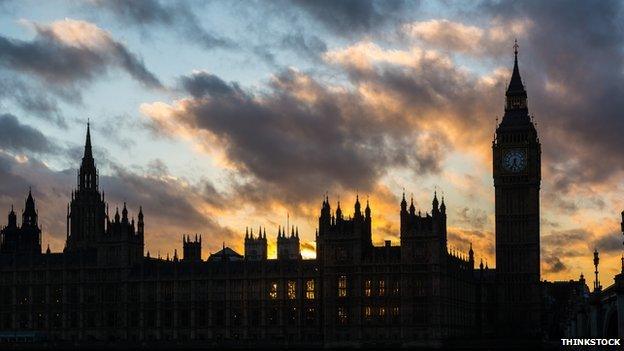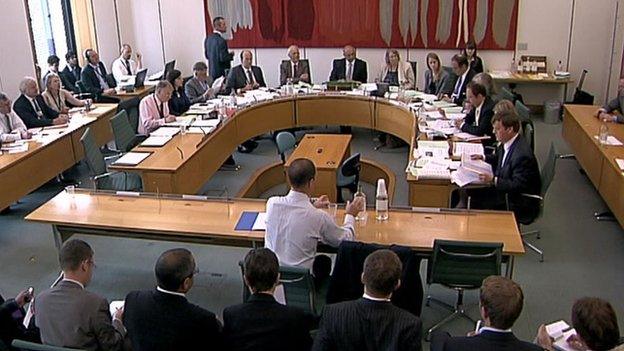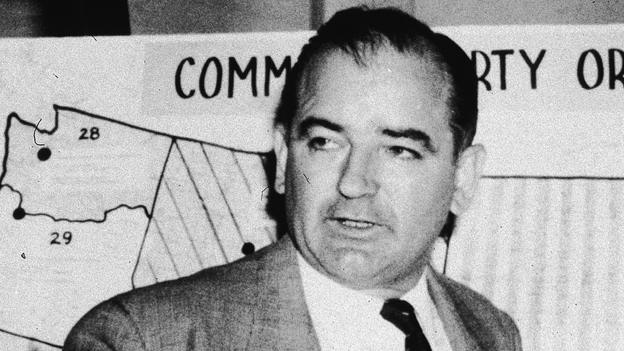A Point of View: Do parliament's select committees wield too much power?
- Published

Parliamentary select committees have seen their profile grow over the past few years, but are they the right way of holding power to account, asks Tom Shakespeare.
The recent expose of senior backbenchers selling themselves as advisers is only the latest of a series of scandals that have brought Parliament into disrepute. Back in the 1990s, there was "cash for questions". In 2009, widespread abuse of the expenses system was revealed by the Daily Telegraph, leading to four parliamentarians being jailed and many others disgraced. But even without this rottenness, there can be scepticism about the way the House of Commons operates. Many people are repelled by Prime Minister's Question Time, when the Commons chamber becomes a cross between a school playground and a bear pit. In 2011, less than two thirds of respondents said they believed it was every citizen's duty to vote, according to the British Social Attitudes Survey. A third of people said they had not much or no interest in politics. The same proportion said they almost never trust government, up from only 11% in 1986. A whopping 71% believed that it does not matter which party is in power.
However, it's not all bad news for politicians. There's one area of our House of Commons that seems to be working better than ever. I'm talking about the select committees. PJ O'Rourke said that committees turn people into idiots, but recently it's been the people who come before Select Committee hearings who have been looking stupid.
For example, it was his appearance before the Culture Media and Sport Select Committee that Rupert Murdoch described as the "most humble day of my life"
Maybe you remember the CEO of G4S being cross-examined by the Home Affairs Select Committee about security at the Olympics?
Or what about the Culture Select Committee grilling the director-general of the BBC over the Jimmy Savile affair? Or the humiliation of private equity business executives?
Screw up in front of a select committee and your reputation will be damaged, and your resignation may even follow. Earlier this month, Rona Fairhead, an HSBC executive and chair of the BBC Trust, was labelled as "totally incompetent" and told to resign by Margaret Hodge, chair of the Public Accounts Committee.
So how have select committees suddenly become so exciting?
If it wasn't for Norman St John-Stevas, a much maligned Tory wet, we wouldn't have select committees at all. Since 1979, fourteen departmental select committees have been shadowing different areas of the government, looking at spending, policies and administration.
In the past, membership and chairmanships of select committees were consolation prizes given to backbenchers who the whips wanted to reward or encourage. Select committees could easily be bullied or over-ridden. Many of the members didn't even bother turning up for meetings. No wonder select committees never hit the headlines.
But in this Parliament, the situation has greatly improved as a result of the reforms promoted by Tony Wright, Mark Fisher and others. Membership of the committees is now voted for by parties, not awarded by the party whips. Select committee chairs were elected for the first time in 2010, so these individuals have a mandate from their peers and the positions are voted for by the whole house, meaning that the chairs have to get cross-party support. Moreover, as they don't have to please the whips to get selected or stay in their role, they have the freedom to criticise government departments, national institutions like the BBC, and even business interests.

Margaret Hodge, Chair of the Public Accounts Select Committee
As a result, select committee chairmanships have become an alternative political career to ministerial office, particularly for newer MPs. You get paid the same salary as a junior minister, but you can expect much more media coverage as a select committee chair.
That's how Keith Vaz and Margaret Hodge have become household names in the last few years. Coverage of individual committees more than tripled between 2008 and 2012. And studies estimate that between 30-40% of select committee recommendations end up as government policy, which is better odds of influence than authoring a private member's bill that has only the slimmest chance of becoming law.
For us, the citizens, there's the advantage that you tend to get independent characters who, dare I say it, know what they are talking about. Sarah Wollaston, chair of the Health Select Committee worked as a GP for 20 years and is particularly critical of the pharmaceutical industry. Rory Stewart, chair of the Defence Select Committee, not only worked for the Foreign Office, but also conducted diplomacy in Iraq and Afghanistan. Both MPs came into Parliament in 2010.
The two select committees that hog most of the headlines are Home Affairs and Public Accounts. And that has been largely because of how their chairs, Keith Vaz and Margaret Hodge, have used their positions to hold powerful people to account. Margaret Hodge has said that she feels she has more influence now than she did when she was a government minister. Between June 2013 and June 2014, she was mentioned nearly 2000 times in the press, more than many government ministers. Vaz is a classic case of poacher-turned-gamekeeper, as he has been investigated and criticised by the Parliamentary standards watchdog in the past. Hodge too has been criticised over her tax affairs.

The Home Affairs Select Committee, chaired by Keith Vaz MP
But when they take Rupert Murdoch or other business leaders down a peg or two, select committee Chairs will have been roundly cheered by millions of us. At last, our parliamentary representatives are representing our views, and standing up for decency and justice. "Keep it up Mrs Hodge," comments one member of the public on a newspaper website. "The HSBC bosses deserve to be bullied" says another.
But there's also a danger in this, and not just of hypocrisy or grandstanding. It's very difficult to defend yourself before a select committee. You're in the full glare of media scrutiny. Thanks to parliamentary immunity, MPs can make any accusation they like, without fearing the libel laws. Adam Lent of the Royal Society of Arts has suggested that "subjecting people, however powerful… to a courtroom style cross-examination without proper procedure or protections borders on the unjust and possibly a departure from due process."
Keith Vaz and Margaret Hodge cut their witnesses off, and stop them providing evidence. They hector them. Then the soundbite we hear on the news is the select committee chair triumphantly labelling their witness a tax cheat or an idiot. No wonder their media profile is high. We may think this is great, and that we are rebalancing our democracy. But we may also begin to have concerns. There's a difference between holding the powerful to account, and putting people in the stocks.
We should not forget how, 60 years ago, US Senator Joe McCarthy led the notorious witch-hunt of supposed communist infiltrators from his role as the chair of the Senate Committee on Government Operations.

Senator Joe McCarthy and the communist "witch hunts"

Joseph McCarthy (1908-1957) was Republican US Senator for Wisconsin from 1947 until his death. He became notorious for claiming that US government institutions had been infiltrated by Soviet spies and communists
First came to public attention in 1950 with claim that there were "card-carrying Communists" in the State Department. He later scaled this down to 57 but only ever named a handful.
None of the claims were substantiated but many lost their jobs or reputations. McCarthy used a combination of intimidation and hearsay evidence to browbeat the accused.
McCarthy found himself under investigation in 1954 after army officials alleged he had tried to obtain preferential treatment for a former aide drafted into the army.
A much-publicised investigation by the Senate ended inconclusively. But in December 1954 the Senate voted to censure Mr McCarthy for abusing his power as a senator - only the fourth time in history a senator had received such a public mark of disapproval.
His career never recovered and he died in obscurity from an alcohol-related illness in 1957 aged 48.

Since 2008, the select committees have been holding hearings for appointments to senior public offices. This role may well be extended, with committees having the power of vetoing people who they do not approve of. They're on their way to the same sort of powers that US congressional committees hold.
Select committees have been a huge success despite being under-resourced and overstretched. They need to have the power to choose what areas they want to prioritise. But we must beware of mission creep. Their main business is the worthy task of holding the government and the civil service to account, even if it's more fun holding unpopular public figures' feet to the fire.
In a few weeks, parliament will be dissolved, and so Messrs Vaz, Hodge, Wollaston, Stewart and their colleagues will be seeking re-election. They may not all be returned as MPs, but even if they are, they will have to persuade the new House of Commons that they should also be re-elected as select committee chairs. Whoever takes these increasingly coveted roles, I think we'll be hearing more about them holding our leaders to account in years to come, as they get more funding, more powers, and above all more confidence in scrutinising public affairs.
In general, committees have a bad reputation. As a result, there are no end of witty quotations about them, often involving camels. The American sociologist William Sumner said: "If you ever live in a country run by a committee, be on the committee." Perhaps we could amend that to: 'If you ever live in a country held to account by a committee, chair the committee."
A Point of View is broadcast on Fridays on Radio 4 at 20:50 GMT and repeated Sundays 08:50 GMT or listen on BBC iPlayer
Subscribe to the BBC News Magazine's email newsletter to get articles sent to your inbox.